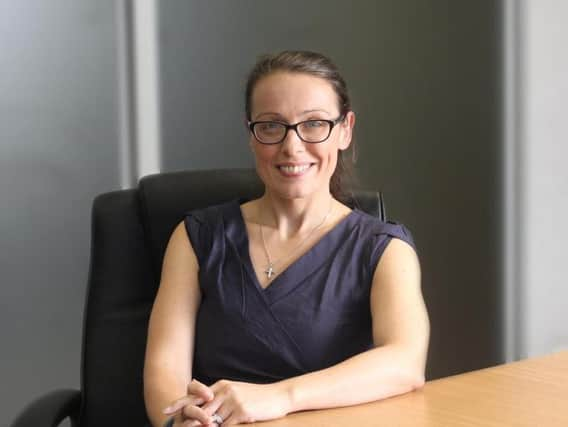Vital surgery that transformed a company's fortunes


In 2014, the group announced a strategic review and former CEO Graham Bowland departed. Write-downs saw the group swing to a dramatic loss of £3.2m and the group’s cash position had to be rescued by interim managing director Chris Rea, who had invested £1.6m in the firm.
A further write down of investment in new facility plans (for which the company had secured a £5m Regional Growth Fund Grant) followed after plans to move to the new site were terminated. Rea brought in Ross as a consultant at the time when the group was in deep trouble.
“The business had lost its way,” says Ross.
Advertisement
Hide AdAdvertisement
Hide Ad“It tried to be all things to all men and it wasn’t as focused as it should have been. When I joined there were several severe problems. It was a fantastic business with fantastic products that are really well received in the market. The people were fantastic too.”
However, things got worse before they got better. In May 2015, full year results revealed the full scale of the problem with exceptional items of £8.4m. Revenues nearly halved to £4m and the group reported a whopping pre-tax loss of £9.8m.
Then it was time to bring in the big guns. In August 2015, Ross was appointed as finance director and company secretary.
In October 2015, Rea resigned as interim managing director and was replaced by small cap expert Nigel Rogers who became executive chairman.
Advertisement
Hide AdAdvertisement
Hide Ad“We put the cash in to drive the business forward and we drew a line under it,” says Ross.
“We paid everyone and it was no longer: ‘We’ll pay you next week’.”
In December 2015, Ross became managing director of the trading business Surgical Innovations. By March 2016, the first full year results under Ross and Rogers showed improving revenues and the group moved from an operating loss to a profit.
In August 2016, interim results showed further revenue growth and a return to first half operating profits. In December 2016, Ross was appointed chief operating officer and in March last year, 2016 results showed an 11 per cent increase in revenue to £6.1m, a return to profit at the pre-tax level and cash generation of £2.85m.
Advertisement
Hide AdAdvertisement
Hide AdSome tough decisions had to be made including reducing the headcount, radically reducing manufacturing output and switching to a work-down of excess inventory. Ross and Rogers also had to unwind the uneconomic incentives given to the distributors by the previous management which had led to overstocking.
“We wanted to hold on to as many people as we could,” says Ross.
Rogers then secured Ross’s position for the long-term and moved her to a leadership role. With Ross focused on the operational side, Rogers focused on the corporate side including rebuilding the board of directors.
The changes have taken Surgical Innovations from a company on its knees to a successful, growing, cash generative business with strong future growth prospects.
Advertisement
Hide AdAdvertisement
Hide AdLast month, Surgical reported strong annual results for 2017 and said 2018 revenue is well ahead of last year, despite a hit from the winter flu crisis and its impact on NHS hospitals at the start of 2018. Winter illnesses caused most UK hospitals to reach abnormally high capacity levels, resulting in the cancellation of many elective surgical procedures.
Now the group is back on its feet, Ross says the firm is working on a number of new products.
“We’ve got products that enable the surgeon to see where they are going so they don’t nick anything on the way into the abdomen. We are really excited about expanding our instrument range,” she says.
As the mother of a six year old daughter, Ross says she would never have been able to pursue her career without the support of her husband Lee, who is an estimator for a steel company.
“He is hugely supportive,” says Ross.
Advertisement
Hide AdAdvertisement
Hide Ad“He allows me to do whatever I need to do. He takes our daughter to school and picks her up. I get home and dinner is on the table.”
Ross and her family live in Doncaster, a place that she loves.
“Doncaster is a really friendly place. It’s a big town but it feels quite small,” she says.
“My family are based there. I’ve got a sister and three nephews there and my parents and my husband’s Mum live there.”
Advertisement
Hide AdAdvertisement
Hide AdRoss’s parents live next door to her husband’s which is how the pair met.
“We had Christmas together as kids. Our parents are really good friends,” she explains.
After University, Ross plucked up the courage to ask Lee out.
“I had also fancied him. He was the boy next door,” she admits.
Advertisement
Hide AdAdvertisement
Hide Ad18 years later, Ross is able to throw herself into her role as she has such a supportive family.
“I work really long hours,” she says.
“I get up at 5.30am, drive to a gym in Leeds and I’m in the office at 8am. I leave at 7pm - that’s the cut off time.”
Her hours mean that she rarely sees her daughter during the week, but she makes up for this at the weekend.
“The weekend is all about us as a family. It’s all about my daughter,” she says.
Advertisement
Hide AdAdvertisement
Hide AdRoss feels blessed that she has such a satisfying home and work balance.
“I am hugely fortunate,” she says.
“I love the job and I love the company I work for. I’m surrounded by passionate people.
“We now have over 70 people. It was 120 and it went down to 50 when I first joined the business. I’m really keen to grow the team.”
Ross has played an enormous role in restoring this Yorkshire company’s fortunes. The firm can now look forward to future growth and prosperity.